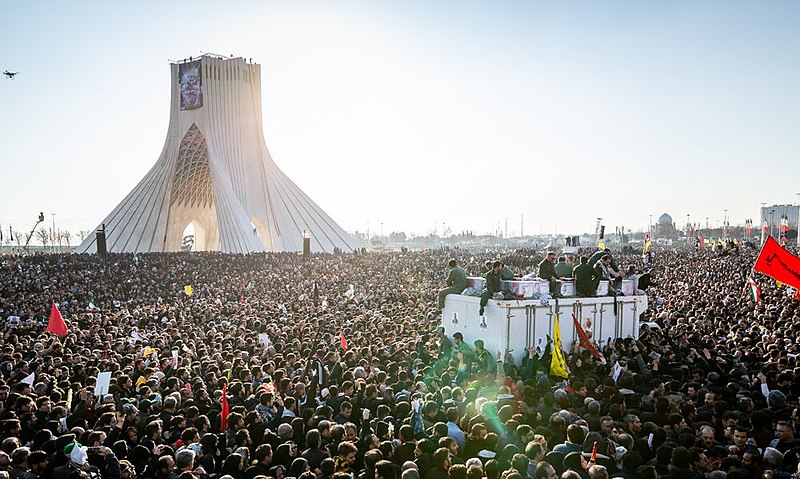THE IRAN CONTROVERSY: BIGGER THAN YOU THINK
Photo courtesy of mehrnews.com
Thousands mourn for Soleimani in Tehran
On January 3, the sudden assassination of Iranian general Qasem Soleimani shocked the world. Soleimani was en route to Iraq as an ambassador, carrying a response from Iran to Saudi Arabia about possibly easing tension in the region. During the journey, Soleimani was killed by a drone strike ordered by President Donald Trump, under the pretense that he had plans to conduct attacks on Americans, though other events such as an Iran-backed siege on an American embassy in Iraq were used to justify the attack as well. Now, make no mistake: this man was a terrorist, and his killing was justified. That is not a problem. The problem is how it was done.
Assassinating Soleimani has and will continue to, lead to ramifications. Constant debates have come up about how this violated Iraqi airspace, meaning that a crucial Middle Eastern ally could turn away from the United States and that we killed a major Iranian leader, which is only going to worsen tensions with Iran. It is true that he was a terrorist, but there were alternatives to killing him directly.
Former Navy Seal Eric Oehlerich, writing for the Middle East Institute, stated that “killing Soleimani could have resulted in a war,” and that the real solution would have been to “selectively target other leaders,” clarifying later that he means Soleimani’s subordinates.
But instead of taking this far less inflammatory move, President Trump opted to go straight to the top. So far, the results have been less than satisfactory.
Through January 4 to January 7, Soleimani had his funeral. On the last day, a stampede broke out and led to the death of 56 people, with another 212 injured. Simply through his burial, lives have been lost, but the body count didn’t stop there.
Later the same day, Iran retaliated with a missile strike against two American airbases in Iraq. Thankfully, no lives were lost, but multiple servicemen were evacuated later with traumatic brain injuries — after it had been reported that there were no casualties at all.
President Trump tweeted that the attack was “not serious,” an utterly disingenuous statement.
The supposed attacks that warranted the assassination of Soleimani have been realized because now all of Iran feels justified in carrying them out.
Innocent lives were lost as well, with the Iranian military accidentally shooting down a Ukrainian passenger plane on January 8, resulting in the deaths of all 176 people on board. This may be brushed off as an accident by others, but these events are connected. The Iranian military would not be on high alert if Soleimani had not been killed. More than 200 people have died so far in connection to this assassination. His death is obviously not worth the numerous innocent lives lost.
As aforementioned, Soleimani was assassinated because he had plans to kill Americans. The Pentagon released a statement on January 2 detailing this further, reaffirming that “this strike was aimed at deterring future Iranian attack plans.” Such plans could have been prevented by killing his subordinates instead, but now this has incensed almost all of Iran against the US. The US does not need more enemies in the Middle East. Soleimani’s murder has just fully cemented Iranian distaste of the US – and, due to the nature of the attack, has possibly worsened the position of the US on a global scale as well.
The main reason for the possible distrust of the US would be that this action violated Iraqi airspace. The Iraqi government did not condone this attack at all, and in fact, they have condemned it.
The Iraqi parliament voted to expel American troops in the region, affirming that the “Iraqi government must work to end the presence of any foreign troops on Iraqi soil.” They included that they need to “prohibit [foreign troops] from using its airspace.”
The effect of this extends beyond Iraq. Now, foreign leaders will be far less inclined to meet with the US or its allies for fear that they will randomly be drone struck for stepping foot outside their country. While there has yet to be any examples so far, there is no doubt that this will induce a halt in negotiations with other nations.
These events may seem to be temporary or have minimal impact, but mark these words: It will have an effect in future dealings with the Middle East, no matter what President Trump or others claim.






